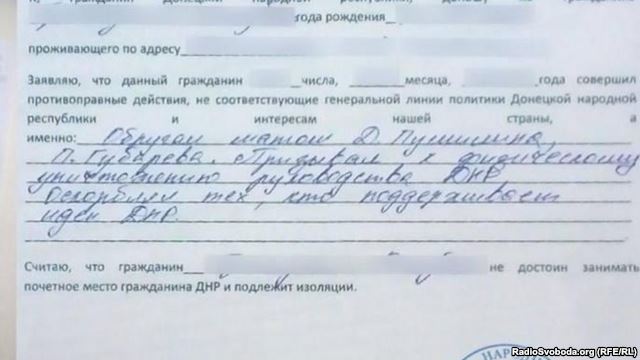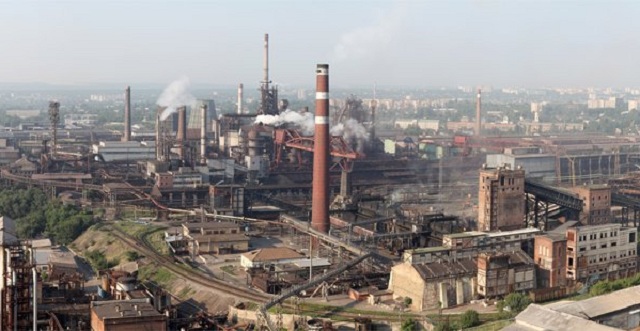The decision to appropriate an entire number of plants and mines was expected: such statements were heard from the former ‘head’ of the ‘DNR High Council’ Denis Pushilin back in May of the current year, immediately after the ‘referendum.’ Besides, the ‘deputy head of the council of ministers’ of the group Alexandr Karaman lamented that the overall sum of the budget they need does not constitute even hundreds of millions of hryvnia, but billions, and is “a burden they cannot carry.” If we take into account that the list of the potentially nationalized objects include the biggest taxpayers in the region, the decision to ‘nationalize’ was only a matter of time.
As such, for example, the blow will land on several of Rinat Akhmetov’s companies: the Yenakiyevo metallurgy factory, the Makiyivka metal factory, the Khartsyzsk pipe factory, Donetskgormash and two complexes for the extraction and enrichment of anthracite belonging to DTEK corporation (Rovenkyantratsyt and Sverdlovantratsyt). It should be noted that these are not the first attacks the pro-Russian groups have made towards the structures that belonging to the richest man in the country: earlier the head of the ‘DNR CEC’ Roman Liagin, aka ‘Minister for Labor and Social Policy,’ expressed the hope that Akhmetov would pay taxes to the ‘republic’s’ budget. Back then the businessman’s press service noted that the “group of companies is working exclusively within the legal field and the current legislation of Ukraine, including legislation on tax payments to central and local budgets.”
However, the conditions have changed somewhat. Besides the fact that the ‘DNR Prime Minister’ Alexandr Zakharchenko emphasizes that some of the businessman’s assets are now already being registered under the ‘republic’ (there is no other evidence of this), it is important to remember that today, they do not ask in the ‘DNR,’ but come bearing guns to execute the ‘Parliament’s’ decisions, regardless of the owner’s wishes or rights. In this situation, the only thing left to do is assume what will happen to Rinat Akhmetov’s business. At the moment he has left the first hundred of the Bloomberg Billionaires Index, having lost about 2,4 billion USD since the beginning of the year (the majority of this sum falls on the past three months).
“Now all the forces of the company and its workers, all the resources are aimed to prepare the energy systems to the heating season. People need heat and light in their homes in Luhansk, Donetsk, Kyiv, Ivano-Frankivsk, and Lviv. Besides, as of today, DTEK Rovenkyantratsyt is the only production facility in the city which, despite the difficult situation, pays its workers their dues in a stable and timely manner. We do not see any grounds for any action regarding our assets,” press secretary of the DTEK anti-crisis headquarters Anton Kovalyshyn commented on the situation to Radio Liberty.
“Russia is their mother”
The nationalization list also includes the chemical giant Stirol, which remains the biggest producer of mineral fertilizers in Ukraine. The citizens of Donetsk oblast connect its owner, Dmytro Firtash, with one of the national TV channels, and their attitude towards the media that do not broadcast Russia’s position is sometimes very categorical. Therefore the re-appropriation of the property belonging to this oligarch was expected during the first wave of the infringement on private property, when they decided to re-appropriate the assets of the head of Dnipropetrovsk oblast Ihor Kolomoysky. However, there is one significant difference in the case of the possible nationalization of Firtash’s company: it is in Horlivka, where Igor Bezler (‘Bes’) leads the mercenaries. He considers ‘People’s Republic of Donetsk’ a ‘banana republic,’ and disregards its political leadership. Therefore, it is unclear how the ‘DNR’ will act.
The Zasyadko mine, which is one of the biggest mining facilities in the country, also ended up being under scrutiny. This fact is especially interesting not only because it practically belongs to Yukhym Zvyahilsky, a veteran regional (this fact should have become a protection for the property from infringement of sorts), but because another famous name is tied to the mine as well: Oleksandr Yanukovych. In 2012 the group MAKO was tied to the mine because of the cunning schemes with the involvement of third parties and other companies. In contrast to the situation with Firtash, the ‘DNR’s’ actions regarding this mine were quite unexpected; many experts tie what is happening in Donbas with the ‘Family’ and therefore they did not expect such a ‘stab in the back.’
The ‘republicans’ did not limit themselves to just one mine: the list for nationalization includes several mining facilities: Shakhtarskantratsyt, Torezantratsyt, Luhanskvuhillya, Donbasantratsyt, Antratsyt etc. So they decided to nationalize Ukraine’s national property.
However, underwater rocks await the ‘republicans’ here.
“First, the Zasyadko mine existed thanks to Yukhym Zvyahilsky, who values it above all. And without him it is unable to work: the mine is very difficult, complex, the depth is up to 1500 meters, the gas layers, it is obvious that there are some events happening there with the involvement of heavy carbohydrates. Second, Makiyivvuhillya mines are also very difficult… I don’t know of any more difficult mines anywhere else. ‘DNR’ won’t manage the. They will lead them to perish in the nearest months. The burrows will freeze this very winter. Besides, they will flood the mines and flood the city,” says head of the Independent Miners’ Union of Ukraine Mykhaylo Volynets. “As to the mines Shakhtarska Hlyboka and Torez, they are also being flooded there. Such mines in Russia are long closed and Russia did not give them a penny of state support. Therefore, the mines will close down, they will be destroyed, there will be mass emergencies, people will die and nobody will remember the ‘DNR’ representatives who approved this decision (on nationalization – ed.). They will flee successfully: Russia is their mother. And most importantly, they are not going to pay salaries.”
“How will we divide water?”
The businessmen whose names are not as famous in Ukraine’s political space may also suffer losses. As such, Viktor Nusenkis may potentially lose the pearl of Donetsk – the Donetsk Metallurgy Factory, as well as the Yasynivskt and Makiyivka chemical plants. Nusenkis is the biggest church charity-doer in Ukraine: he paid for the construction of all significant temples of the Donetsk eparchy. However, it looks like this status is insignificant to the mercenaries, who position themselves as one of the last pillars of the Christian faith. There is a small possibility that the businessman’s property may be saved by his status as a Russian citizen, however nobody can make any guarantees today.
Another name on the list of businessmen who may lose their property is Andriy Alyosha, a member of the Donetsk city council. It is strange, the Makiyivka piping factory they are allegedly planning to take away from him has not worked for a long time, and part of its territory was put up for sale back in 2013. It is possible that the ‘DNR’ plans to ‘nationalize’ private land as well, but that is a totally different matter.
“First, nationalization in such a limited space is very difficult to execute. For example, SKM holding. Where are its accounts, the main managing structures? Outside of the ‘DNR.’ Production itself is definitely tied to the location of the facilities. For example, Mariupol. Its two biggest factories there are under Ukraine’s jurisdiction, and the Yenakiyevo and Makiyivka factory are under ‘DNR’ jurisdiction. And there are numerous such examples. Besides, how can they divide infrastructure? For example, water, which flows on the Siversky Donets – Donbas channel, its beginning is on the territory of the Krasnolymansky district, where Ukrainian jurisdiction is located, and then at the end of its way it falls under ‘DNR jurisdiction.’ So how will we divide water? What to do with electricity? The electricity lines are like blood vessels which intercede the entire territory and are part of a single energy system. So it looks like these are mottos that do not lead to any serious consequences later,” emphasized the director of the Center for Eurasian Studies Yury Makohon.
As is obvious from the list of names that fell under the ‘republic’s’ displeasure, the nationalization lists include mostly very rich people. It is possible that they ended up as targets of expropriation because of their unwillingness to cooperate with the regime, meanwhile the ‘DNR government’ declares its plans to build a ‘state’ without oligarchs. Is there an alternative plan if the biggest companies in the regions stop receiving supplies from Ukraine and send their resources there, the department of the base industries of the Donetsk oblast administration is unwilling to comment. However, sources confirm that such a scenario has been prepared.
What kind of influence can Ukraine have on this? Head of state-owned business Energoatom Yury Nedashkovsky recently stated that it is necessary to stop supplying electricity to the territory which is being controlled by pro-Russian mercenaries, not to “bring about a hole in payments.” Industries in the region now consume 77% of all electricity. On the one hand, by cutting off territories which are out of Ukraine’s control from electricity supplies, we would rid several millions of people of the essential resources. On the other, if ‘DNR’ succeeds in taking control of the big industries in Donbas, energy suppliers will end up in a complex situation: nobody in their right minds would want to provide services to a client who is unwilling to pay. Even the taxes go to someone. Therefore the culmination is probably coming closer.








